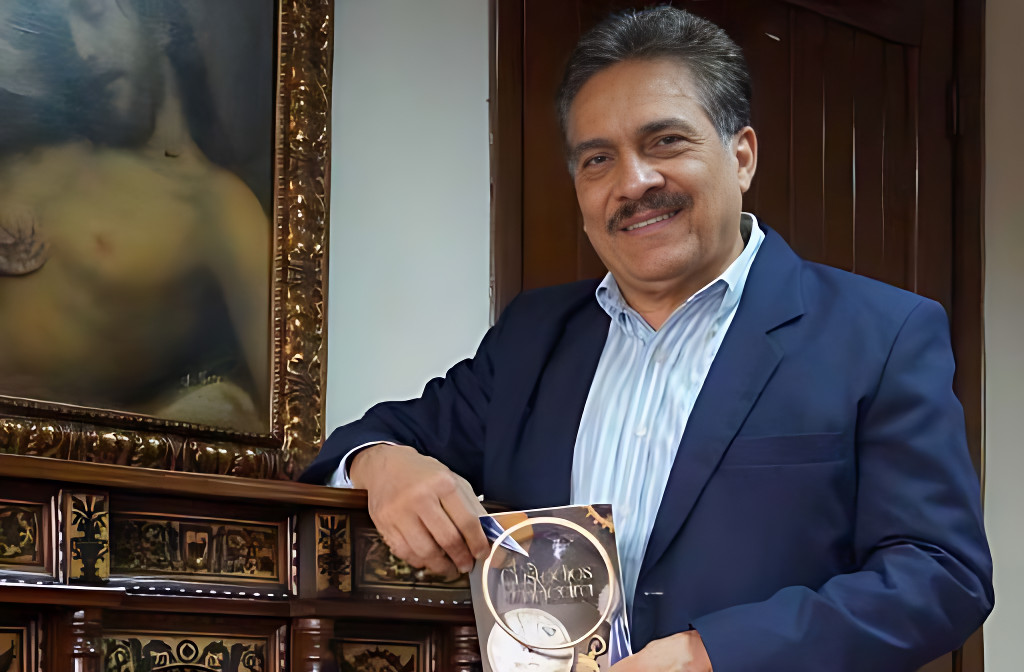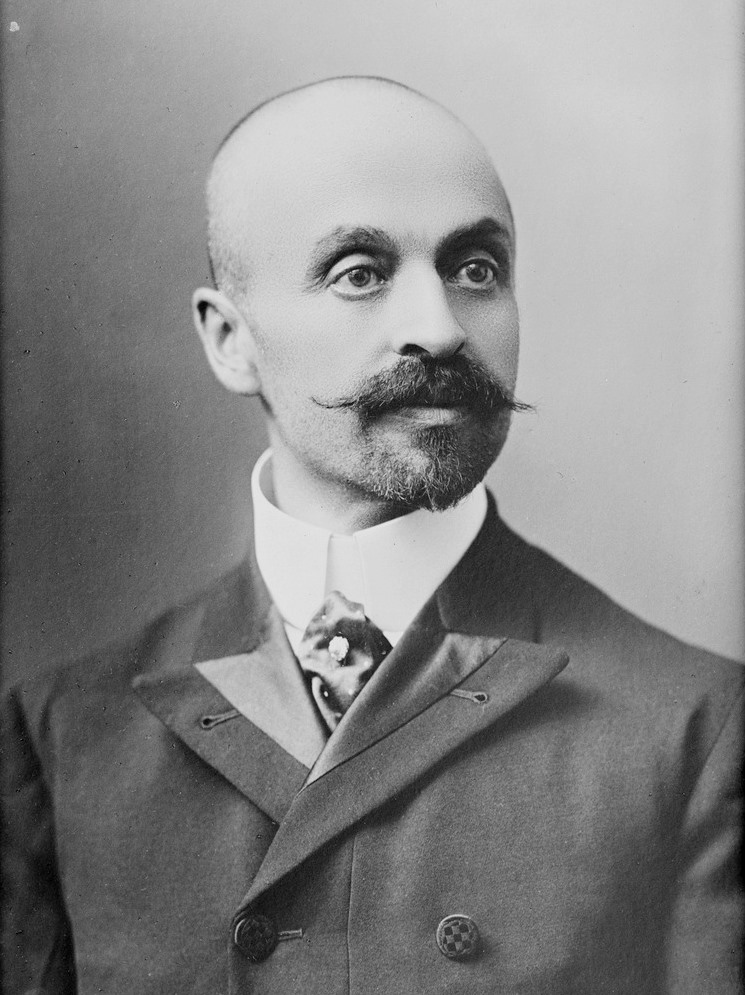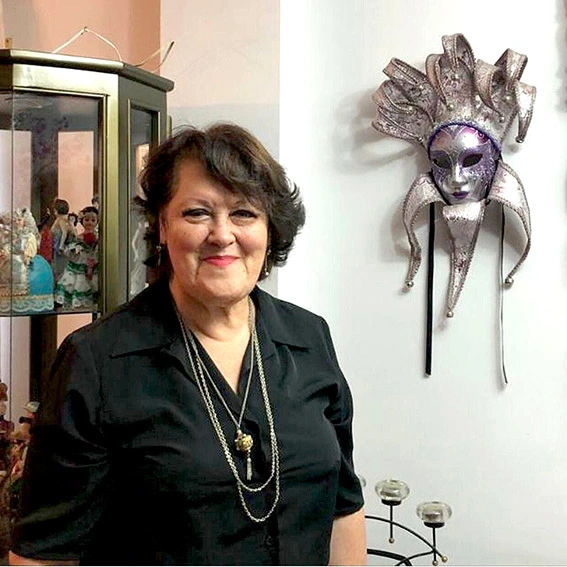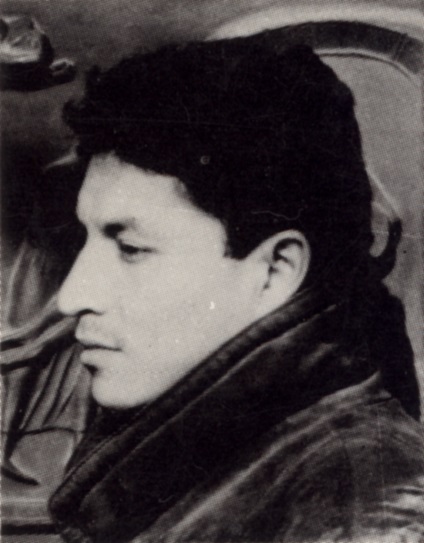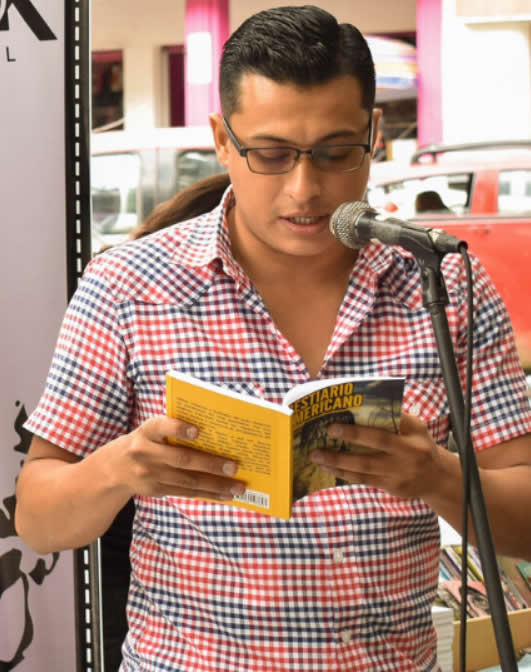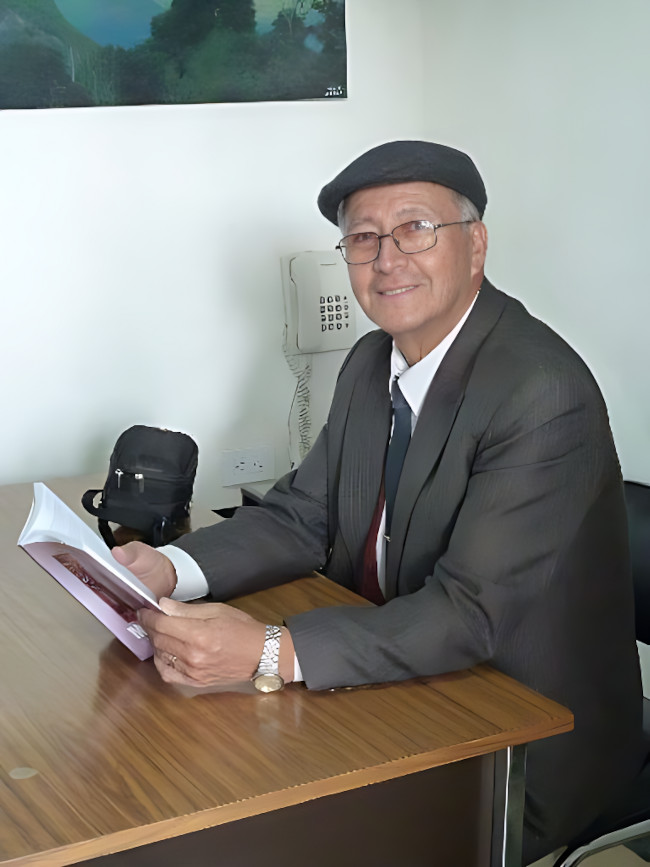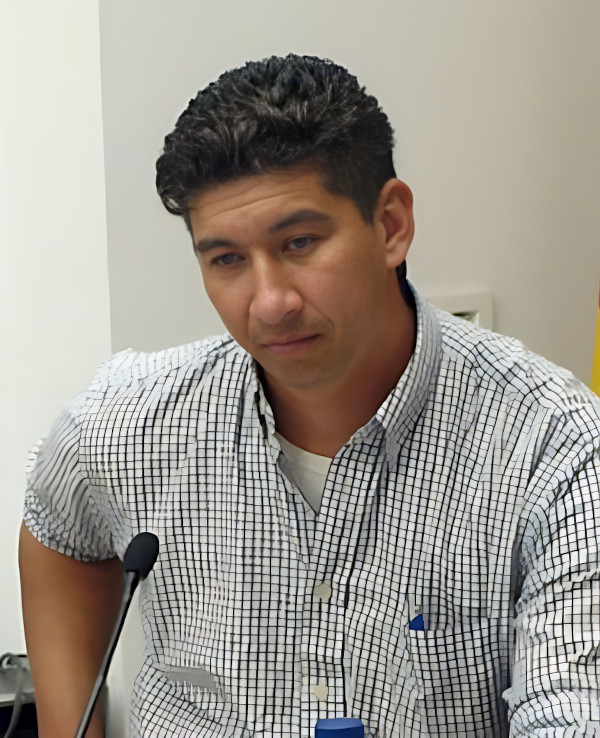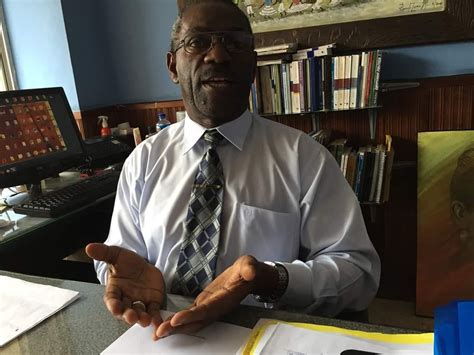Power Paola, pseudonym of Paola Andrea Gaviria Silguero (Quito, June 20, 1977) is a Colombian-Ecuadorian comic artist and author of graphic novels. Among her most noteworthy works is the 2011 graphic novel “Virus Tropical,” which has been widely praised. It was later translated into both English and French by Random House / Mondadori. Paola also contributed to the adaptation of this novel into an animated film in 2017, which subsequently won the 2019 Quirino Award for Best Ibero-American Animation Feature Film. Paola’s other notable works include “Por Dentro” (2012), “Diario” (2013), “qp” (2014), “Todo Va a Estar Bien” (2015), and “Nos vamos” (2016). Power Paola’s body of work deals with diverse themes including sexuality, feminism, family dynamics, and personal identity. She’s a member of a comics collective called Chicks on Comics.
Continue reading “Power Paola”Author: richard
Fernando Naranjo Espinoza
Fernando Naranjo Espinoza (Guayaquil, 1954) is an Ecuadorian writer, architect, watercolorist, and illustrator. He has made significant contributions to the realm of science fiction, a genre relatively unexplored in Ecuadorian literature. With his boundless imagination and captivating storytelling abilities, Naranjo Espinoza takes readers on extraordinary journeys through time, space, and alternate realities. In recognition of his talent, he received an Honorable Mention in the prestigious National Contest “José de la Cuadra” in 1979. Among his notable works is “La era del asombro” (1994), which garnered acclaim and recognition in the National Contest “Ismael Pérez Pazmiño.” Another noteworthy publication is “Cuídate de los coriolis de agosto” (2006). While primarily known for his science fiction stories, Naranjo Espinoza also ventured into the realm of the social novel with his book “Guasmo sur” (2013), which earned him the Second National Novel Prize in 2010. His most recent work, “Los custodios de la piedra” (2018), is a captivating collection of science fiction stories that delve into themes of time travel, memory, and the manipulation of reality. Since August 2017, Fernando Naranjo Espinoza has been serving as the Director of the Guayas Branch of the House of Ecuadorian Culture.
Continue reading “Fernando Naranjo Espinoza”Honorato Vázquez Ochoa
Honorato Vázquez Ochoa (Cuenca, October 21, 1855 – January 26, 1933) was an Ecuadorian diplomat, lawyer, educator, painter, grammarian, writer, and poet considered one of the most prominent figures of Cuencan lyricism in the 19th century. Vázquez’s literary works spanned different genres, including poetry, essays, and historical accounts. Notable among his works is the poetry book “Los sábados de mayo,” co-written with Miguel Moreno, which exemplified the tendencies of national romanticism in Ecuador. Vázquez’s poems, such as “Morenica del Rosario,” demonstrated his sentimentality and mastery of language, including the use of archaic Spanish. Furthermore, his contributions to the field of linguistics were notable, with regular essays on the Spanish language, Quechua, neologisms, and other language-related topics. In 1886, at the age of 31, he delivered his induction speech to the Ecuadorian Academy of Language, making him one of the youngest members to ever join.
Continue reading “Honorato Vázquez Ochoa”Susana Álvarez
Susana Álvarez, born Martha Susana Álvarez Galarza (Ambato, 1949) is an Ecuadorian writer, poet, educator, and cultural activist. Throughout her career, she has made significant contributions to literature, particularly in the field of poetry and cultural preservation. Some of her notable poetry books include “Memorial de los días,” “Celosía del Alba,” and “Fiorella de Agua.” In addition to poetry, she has written essays such as “Ellos son y Están aquí…. Encuentros” and “Mujeres bajo el cielo de Loja. La investidura de La Mujer del Siglo XXI.” Álvarez’ dedication to preserving Ecuadorian cultural heritage is evident in her books “Antología de la leyenda ecuatoriana” and “Loja y sus leyendas,” which delve into the country’s rich folklore and legends. Recognized for her literary achievements, she has received prestigious awards, including the “Juan León Mera” decoration and the Illustrious Ecuadorian Woman Award in 2015. Recently, she received the prestigious “Matilde Hidalgo Navarro” decoration at the 2023 Women’s Art Encounter. This recognition, bestowed by the House of Ecuadorian Culture in Loja, acknowledges her outstanding cultural contributions in both Loja and Ecuador.
Continue reading “Susana Álvarez”Julia Rendón Abrahamson
Julia Rendón Abrahamson (Quito, 1978) is an Ecuadorian writer. She has authored the novel “Lengua ajena” (2022), which explores profound themes of identity and belonging. In addition to her novel, Rendón Abrahamson has released two collections of short stories, including “Yeguas y terneros” (2021) and “La casa está muy grande” (2015). Her remarkable talent has garnered recognition, including being awarded the Montserrat Roig Grant for Literary Creation in 2021 by the City Hall of Barcelona, as part of UNESCO’s City of Literature program. Rendón Abrahamson’s educational background is just as impressive, with degrees from renowned institutions such as Boston College, Parsons School of Design, the National University of the Arts in Argentina, and the Argentine institute Casa de Letras. She also teaches creative writing workshops and founded Espacio Cultural PezPlátano in Quito.
Continue reading “Julia Rendón Abrahamson”Melanie Márquez Adams
Melanie Márquez Adams (Guayaquil, May 5, 1976) is an Ecuadorian American writer, editor, and translator. Among her published books are “Mariposas negras” (2017), a collection of stories, and “Querencia” (2020), an exploration of identity and finding one’s sense of belonging in a foreign land. As an editor, Márquez Adams has curated anthologies such as “Del sur al norte: Narrativa y poesía de autores andinos” (2016), which showcases the narratives and poetry of Andean authors, and “Ellas cuentan: Antología de Crime Fiction por latinoamericanas en EEUU” (2019), highlighting the crime fiction works by Latin American women in the United States. Márquez Adams has received accolades such as the Latino Book Award for her exceptional work as an editor. Her latest work, “Imaginar países” (2021), was a finalist for the 2022 Premio Paz de Poesía (Paz Poetry Prize).
Continue reading “Melanie Márquez Adams”Paco Benavides
Paco Benavides, born Javier Palmiro Benavides (San Gabriel, Carchi province, December 4, 1964 – Bern, Switzerland, June 24, 2003), was an Ecuadorian writer, poet, painter, and sociologist. He was a founding member of the Matapiojo writing workshop, which aimed to socialize the means of literary production. His notable work, “Historia natural del fuego” [Natural History of Fire], garnered recognition in 1990. His other poetry books include “Viento Sur” (1995), and “Tierra Adentro” (1995). After relocating to Bern, Switzerland, with his wife, he continued his literary and artistic pursuits. His passing on June 24, 2005, in Bern saw his remains transferred to Quito, Ecuador, leaving behind a wealth of unpublished writings, paintings, and installations. His last known work, “X, (vida y milagros” was published posthumously in 2021.
Continue reading “Paco Benavides”Diego Maenza
Diego Maenza (Los Ríos, 1987) is an Ecuadorian writer. He is known for his works in poetry, fiction, and novels, which have been translated into several languages. In 2018, Maenza published “Caricreaturas,” a work that combines short stories and poetry. It was a finalist in the call for applications from the Ministry of Culture of Ecuador. The book was later translated into Italian by Alessandro Elias Ghetti and into English by Gastón Jofre Torres. Also in 2018, the National Headquarters of the House of Ecuadorian Culture published Maenza’s novel “Estructura de la plegaria” (Structure of Prayer). This work tackles sensitive topics such as pedophilia and abortion within the context of the intimate lives of Catholic clergy. The novel has been translated into Italian, English, French, Portuguese, German, and Russian. In 2019, Maenza released his poetry collection “Bestiario americano” (American Bestiary), which poetically condenses urban legends and myths from across the Americas. His second novel, “Todas las cartas de amor son ridículas” (All Love Letters Are Ridiculous), was published in 2020. It is a parody of romance novels written in an epistolary format and deals with themes of sexual violence.
Continue reading “Diego Maenza”Pedro Reino
Pedro Reino Garcés (Cevallos, February 9, 1951) is an Ecuadorian writer, historian, and journalist. He has published numerous works on the history of the Tungurahua Province and serves as the official chronicler of Ambato. Reino has written in various genres including poetry, short stories, novels, and essays. He has received recognition and awards for his literary contributions, and his books have been translated into languages such as Japanese, Korean, Serbian, and German and published internationally. Reino’s works delve into historical and cultural aspects of his region and reflect his passion for storytelling and preserving local heritage. He is a member of the Ecuadorian House of Culture, Tungurahua Branch. Since 2014, he has been a member of the National Academy of History.
Continue reading “Pedro Reino”Esteban Michelena
Esteban Michelena Ayala (Quito, 1963) is an Ecuadorian novelist, writer, and journalist. He is perhaps best known for his trilogy of novels, which includes “Atacames Tonic” (2002), “No more tears” (2018), and the critically acclaimed “El pasado no perdona” (2022) which embodies a genre defined by the author as “tragic realism.” Additionally, through his nonfiction writings, Michelena explores the realities of his country, addressing topics such as political corruption, social inequality, and the struggles faced by marginalized communities. As a journalist, Michelena has been honored with 12 national awards and recognitions, including the “Jorge Mantilla Ortega” award by the newspaper El Comercio on three occasions.
Continue reading “Esteban Michelena”Victoria Puig de Lange
Victoria Puig de Lange (Guayaquil, December 3, 1916 – Miami, May 14, 2008) was an Ecuadorian author, composer, diplomat, and influential figure in journalism and the fashion world. Throughout her long career, she held notable positions such as Editor-in-Chief of Harper’s Bazaar (Spanish edition) and worked as a Latin American syndicated columnist. Puig’s autobiography, “Sol Con Agua,” blended elements of magic realism with her personal memoirs of a life surrounded by presidents, movie stars, and international personalities. She played a significant role in promoting Latin American designers, co-founding the first Latin American fashion week and being actively involved in major fashion events in London, Milan, and Paris. As a diplomat, Puig represented Ecuador as Consul General in Miami, while also showcasing her musical talents as a songwriter and performer. Recognized for her contributions, Puig received numerous accolades and awards, including Honorary Citizen of Florida and the Woman of the Year award in Ecuador. Victoria Puig de Lange left a lasting legacy in the realms of journalism, fashion, and cultural diplomacy.
Continue reading “Victoria Puig de Lange”Ramiro Oviedo
Ramiro Oviedo (Chambo, Ecuador, 1952) is a renowned poet and writer known for his literary contributions in Ecuador and France. He relocated to France in 1987, where he taught Latin American literature at Université du Littoral. Oviedo has published several acclaimed books. His collection, “Les poèmes du colonel” (2002) won the Trouvères Prize in 2002 and the Claude Sernet Prize in 2004. His captivating writing delves into the existential struggle for meaning in life and the challenges individuals face. Oviedo’s dedication to literature and teaching has made him a prominent figure in the international literary community, shaping the minds of aspiring writers and contributing significantly to the cultural exchange between Latin America and Europe.
Continue reading “Ramiro Oviedo”Antonio Vidas
Antonio Vidas, pseudonym of Dimas Antonio Garcìa Vinces (Santa Ana, Ecuador, April 25, 1974) is an Ecuadorian poet. His works are deeply rooted in his country, family, and natural surroundings. Residing in Palma de Mallorca, Spain, Vidas explored themes of nostalgia, migration, and the human experience in his poetry. He is the author of at least two poetry books: “El arpa del ceibo en llamas” (2010) and “El náufrago y la isla” (2011). Through his poems, Vidas reflects on his birthplace and invites readers on a journey of introspection and self-discovery.
Continue reading “Antonio Vidas”George Perdomo Rodríguez
George Perdomo Rodríguez (Muisne, Esmeraldas, 1952) is an Ecuadorian writer and poet. After leaving his homeland, he settled in Palma de Mallorca, Spain. Through his literary works, he explores themes of immigration, capturing the struggles, aspirations, and emotions of those who leave their homeland in search of a better life. George Perdomo Rodríguez’s writing reflects his own experiences and offers a profound understanding of the human condition, resonating with readers both in Ecuador and Spain. “His books include: Balada del emigrante,” “Los sueños de las palomas,” “Saga de emigrantes,” “Senderos de Espumas,” “Isla de Ensueños,” among others.
Continue reading “George Perdomo Rodríguez”Diógenes Cuero Caicedo
Diógenes Cuero Caicedo (Esmeraldas, October 28, 1948 – Ibidem, January 3, 2019) was an Ecuadorian poet, cultural activist, lawyer, university professor, and a prominent voice in celebrating and affirming black identity. Born in the poor black community of San Francisco de Ónzole in the Eloy Alfaro Canton, Cuero dedicated his life to promoting the culture and heritage of Afro-Ecuadorians. His literary journey began in the 1980s, using poetry as a means to explore themes of blackness, social justice, and the rich cultural legacy of his community. Through works like “Tsunami, Mitología y Poesía” and “Las Huellas de la Carimba,” Cuero illuminated the experiences, struggles, and contributions of Afro-Ecuadorians, challenging stereotypes and fostering a deeper understanding and appreciation of black identity. His impact as a poet and cultural advocate continues to resonate, leaving a lasting legacy in Ecuadorian literature. He held a doctorate in Jurisprudence and for 20 years hosted a radio program called “Raíces” (Roots), where he spoke about the culture of his people.
Continue reading “Diógenes Cuero Caicedo”

